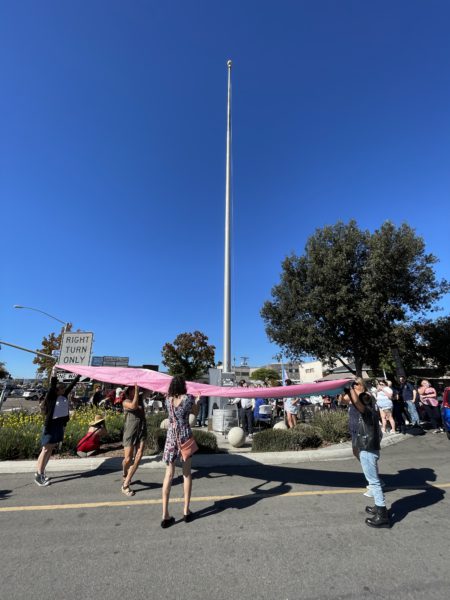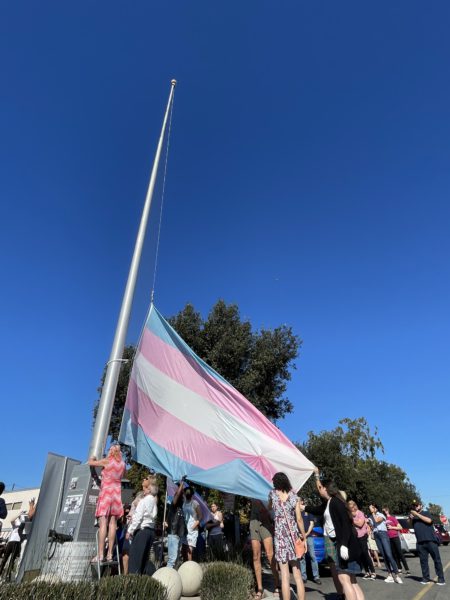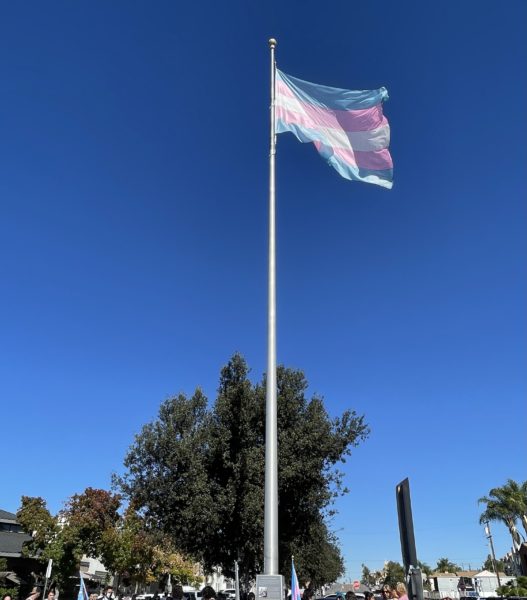Transgender
Even before COVID, LGBTQ+ youth faced a high risk of homelessness
‘The pandemic only made things worse – A Trans woman shares her journey from homelessness to hope’
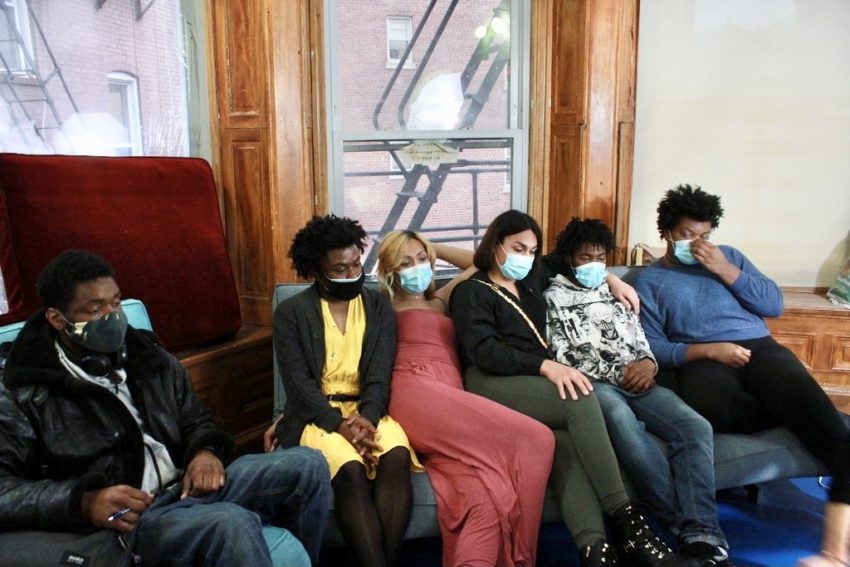

By Sarah Gandluri and Sydney Johnson | WASHINGTON – Squashed between friends on a plush couch at a shelter for homeless LGBTQ+ young people, Jada Doll talked about what happened after she began to express her identity as a transgender woman.
She moved in with her boyfriend when she was a senior in high school. But Doll – that’s the name she chose – said her family refused to let her back into their Manassas, Va. home when the couple broke up. The reason, said Doll: She had begun to identify as a female. She wound up in the nearby woods that became her home for almost three years.
“When it was raining,’’ the 22-year-old said in a recent interview, “I couldn’t feel my toes.”

Before the pandemic, LGBTQ+ youth had a higher risk of homelessness and the health problems that come with it – from nagging toothaches to life-long trauma.
Then COVID-19 forced families to stay home together, exacerbating the domestic conflicts over gender and sexuality that have driven some young people into the street.
Casa Ruby, the shelter that Doll entered, reports a 60% increase in clients in the past year. The non-profit in the Dupont Circle neighborhood offers housing, preventative healthcare and social services to LGBTQ+ youth.
Many of the new homeless had no choice. Violence against LGBTQ+ youth often ‘’starts at home,’’ said Keith Pollard, a case manager at Supporting and Mentoring Youth Advocates and Leaders (SMYAL), a Washington non-profit that shelters about three dozen homeless LGBTQ+ youth. About 95 percent of SMYAL residents were thrown out because of their sexuality or gender identity.
Doll said she felt her family ganged up against her when she started to identify as a trans female. That, Pollard said, is a familiar story: “It starts with not being able to explore gender, with ‘Mom caught me with a skirt on’ or ‘Mom caught me with makeup on and put me out.’’’
‘They see you as a prostitute’
Being homeless can lead to a multitude of health and safety issues, but LGBTQ+ youth face unique, additional challenges.
Fear of violence looms over their heads, both on the street and in public shelters. Some shelters, Doll said, are “like jail. Other residents, she said, “can hurt us, and they don’t care if they hurt us.”
Sexual assault is an even larger worry. “They can also rape you in a shelter,’’ said another resident of Casa Ruby who calls herself Raven Queen.
Such fears are founded, according to Tearra Walker, who has lived in shelters and now helps find housing for the homeless. Some older shelter residents are sexual predators, she said, and young LGBTQ+ people “can get caught up in someone’s web.”
The streets can be even worse. Doll said insults are hurled at LGBTQ+ youth — “They see you as a prostitute.’’ In fact, said SMYAL’s Pollard, many of these young people resort to ‘‘survival sex’’ to secure a place to sleep at night.
“Once you’re out there on the street past four hours, you gonna be losing it,’’ said Nicholas Boyd, a Casa Ruby resident. “You gotta find someone to talk to, someone to socialize with, because the feeling of aloneness is scary.”
Physical health suffers as well. Pollard said that when young people come in off the street, they’re often malnourished or underweight, because “they’re just eating anything they can get their hands on.’’ That, plus lack of sleep, can also lead to attention deficits, mood disorders or suppressed immunity to disease and infection. Many suffer from sexually transmitted diseases and infections, including HIV, he said.
For more than two years, Doll lived under a canopy of trees, protected from the elements only by flimsy tents. Hygiene and privacy were the first casualties; she recalled having to use a water bottle to shower “with everyone watching.”
She ate “just about anything, like, raw stuff.” She neglected to brush her teeth. She suffered insomnia and panic attacks that continued even in the safe haven of Casa Ruby.
Brian Klausner, medical director of community population health at WakeMed hospital in Raleigh, N.C., works with the chronically homeless through a partnership with a local federally-funded health care clinic. He said their average life expectancy is about 50 (compared to 79 years for all Americans). The homeless are more likely to have suffered childhood traumas — sexual abuse, incarcerated parents, drug use in the home — which increase the risk of health issues such as heart disease, cancer, stroke and suicide, said Klausner, a primary care physician. And homelessness itself exacts a cost.
The pandemic has upped that cost. As a result of COVID restrictions, Pollard said, his organization saw an increase in drug and alcohol use as well as physical and verbal altercations: “A lot of folks were doing things that were risky, (like) going outside without a mask, interacting with large groups of people, because they could not take the isolation.’’
‘A lot to handle’
Olivia Rodriguez-Nunez said that when her older sister threatened to attack her because she’d begun to identify as a trans woman, their mother flew from Bolivia to Washington to intervene – on the side of the older sister, to “kick me out.’’
Rodriguez-Nunez’s sister, Mariela Demerick, said in a phone interview that she blames Olivia – who she calls “Mark” – for being abusive and three months behind on rent. Their mother flew up “to come set order to this home,” she said.

Demerick insisted that “it had nothing to do with his choice of sexuality,” but declined to call Olivia by her preferred name and pronouns and blamed hormones for making her sibling erratic.
“I’ve chosen to remove Mark out of my life.” she said.
Rodriguez-Nunez said she fled her family home in the Columbia Heights neighborhood because “having two people gang up on me, it was a lot to handle,’’ But she felt safe at Casa Ruby, which aims to be more than a shelter, but also a home where queer, transgender and gender non-conforming people can escape fear of discrimination, harassment and violence. Above all, places like Casa Ruby and SMYAL try to offer the one thing their young clients often lack: consistency.

Doll is now living in a transitional apartment provided by SYMAL, while Rodriguez-Nunez was referred to a transitional group home run by the Wanda Alston Foundation.
“Our folks have had a lot of people give up on them,’’ Pollard said. “Parents or guardians give up on them because they don’t agree with their sexuality or gender identity and kick them out.’’ Teachers,foster parents or group homes also give up on kids, sometimes, he said, “just because they’re troubled.’’
“Here at Casa Ruby, it is very welcoming,’’ said Raven Queen. “Everyone can live their own life. They can be who they want.”

Sarah Gandluri and Sydney Johnson are high school students at Our Lady of Good Counsel High School and The Baltimore Polytechnic Institute in Baltimore. They were participants in Urban Health Media Project’s workshop, “Home Sick: How Where We Live Impacts Health” in Spring of 2021. UHMP student reporters Anthony Green, Malaya Mason, Noah Pangaribuan and Diamond LaPrince contributed to this story.
The preceding story was previously published at The Washington Blade and is republished here by permission.
Transgender
Trump bans transgender service members from U.S. armed forces
Lambda Legal, HRC announce plans to sue

President Donald Trump on Monday signed a series of executive orders focused on the military, including a directive gutting the Pentagon’s diversity, equity, and inclusion programs along with another banning transgender service members from the U.S. armed forces.
White House officials said new military standards for mental and physical readiness will exclude transgender troops, which would mean the EO goes further than the ban Trump implemented during his first term in 2017.
Among the first actions the president took after his inauguration on Jan. 20 was rescinding the order that former President Joe Biden signed immediately after he took office in 2021 that allowed trans and gender diverse service members to serve openly.
“The implementation [of the ban] is on the DoD regarding specifics,” a White House official told CNN.
A February 2018 memo by the U.S. Department of Defense contained carveouts to exempt trans service members already in uniform who had joined the military prior to the policy excluding them, along with those who do not require a change in gender or those who have been “stable for 36 consecutive months in their biological sex prior to accession.”
DEI practices, meanwhile, will be subject to review by Defense Secretary Pete Hegseth, who was narrowly confirmed by the U.S. Senate on Friday.
Lambda Legal and the Human Rights Campaign on Monday announced plans to sue the Trump-Vance administration “to block implementation of yet another discriminatory and dangerous attempt to bar patriotic transgender military service members from serving openly in the U.S. armed services,” Lambda Legal said in a press release.
“We have been here before and seven years ago were able to successfully block the earlier administration’s effort to prevent patriotic, talented Americans from serving their country,” said Sasha Buchert, Lambda Legal counsel and director of the Nonbinary and Transgender Rights Project. “Not only is such a move cruel, it compromises the safety and security of our country and is particularly dangerous and wrong. As we promised then, so do we now: we will sue.”
“Thousands of current service members are transgender, and many have been serving openly, courageously, and successfully in the U.S. military for more than eight years — not to mention the previous decades when many were forced to serve in silence,” Buchert added. “Once again, as during the first term, the Trump administration is attacking a vulnerable population based on bias, political opportunism, and demonstrably untrue ‘alternative facts,’ denying brave men and women the opportunity to serve our country without any legitimate justification whatsoever.”
Sarah Warbelow, vice president of legal at HRC, said “Our military servicemembers, including thousands of transgender troops, wear the same uniform, take the same oath, and meet the same rigorous standards,” adding, “They are heroes who put their lives on the line to protect our country—and we owe them all a debt of gratitude.”
“Instead, this discriminatory ban insults their service and puts our national security at risk. Expelling highly trained members of our military undermines military readiness and wastes years of financial and training investments,” Warbelow said.
“It also needlessly upends the lives of families who have already sacrificed so much,” she said. “The Commander-in-Chief should prioritize our military’s safety and readiness, not use his position to issue bans on entire groups of people. This order is unconstitutional, and we will see this administration in court.”
SPARTA Pride, a nonprofit of transgender people who currently serve or have served in the military, released a statement on Monday:
“Transgender Americans have served openly and honorably in the U.S. Armed Forces for nearly a decade. Thousands of transgender troops are currently serving, and are fully qualified for the positions in which they serve.
“Transgender service members currently fill critical roles in combat arms, aviation, nuclear engineering, law enforcement, and military intelligence, many requiring years of specialized training and expertise. Transgender troops have deployed to combat zones, served in high-stakes missions, and demonstrated their ability to strengthen unit cohesion and morale.
“While some transgender troops do have surgery, the recovery time and cost is minimal, and is scheduled so as not to impact deployments or mission readiness (all of which is similar to a non-emergent minor knee surgery). The readiness and physical capabilities of transgender service members is not different from that of other service members.
“SPARTA Pride is standing by to support all transgender service members impacted by this policy.”
“Donald Trump’s executive orders are not only cruel, discriminatory, and wrapped in disinformation, but they will make all of us less safe. Throughout our military’s history, thousands of transgender people have served with honor, integrity, and bravery,” said Fatima Goss Graves, president and CEO of the National Women’s Law Center. “Attempting to ban them is an insult to their humanity and the contributions that they have made.”
“Additionally, Trump’s decision to remove diversity, equity, and inclusion initiatives will lead to further harassment in our ranks, making underrepresented service members a greater target for discrimination,” she said. “Already we are hearing reports of anti-harassment policies being taken down based on the order to end equity and inclusion initiatives, which is appalling, misguided, and a gross insult to those who serve.”
Goss Graves added, “Everyone, regardless of race, gender or sex, should be able to work with dignity— including in the military — without fear of discrimination and harassment. We will continue to fight against these harmful abuses of power.”
Transgender
Win for the TGI community addresses need during vulnerable time
The Trans, Gender Nonconforming, Intersex community is especially vulnerable under incoming administration
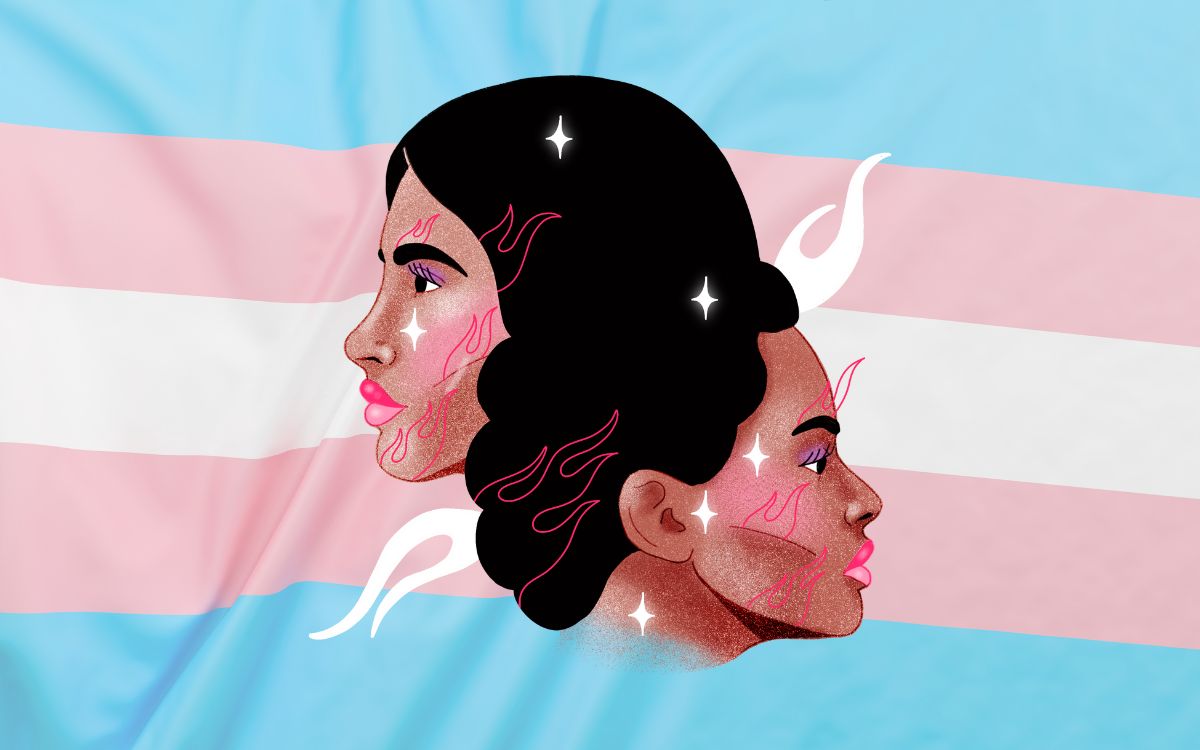
The Trans, Gender Nonconforming and Intersex Wellness and Equity initiative has now been approved by the Board of Supervisors.
The TransLatin@ Coalition’s Policy Team advocated for the motion for two years to get the Board of Supervisors to invest $7 million dollars to fund TGI resources in Los Angeles.
The organization hosted a press conference in both English and Spanish outside of the Kenneth Hall of Administration last Tuesday, calling for city council to approve item 23 on the Board of Supervisors agenda, stating the urgency for local government responses during a particularly vulnerable time for the TGI community.
The motion was put on the table by Board Chair Supervisor Lindsay Horvath and later approved by the Board of Supervisors to support TGI and immigrant residents with housing, mental health and immigration assistance.
“This is kind of a follow-up from the initial legislation that we introduced through Assembly Bill 2218, where the State of California invested $13 million dollars to support TGI-led organizations across the state,” said TransLatin@ Coalition CEO and co-founder, Bamby Salcedo.
AB-2218 was passed in 2020 to establish a Transgender Wellness and Equity Fund, with the goal of supporting health and housing assistance and educational resources.
Now, TGI WE will secure funds for nine TGI-led organizations across Los Angeles.
The TransLatin@ Coalition said in an Instagram post following the win, that this marks a significant milestone in the support of TGI and immigrant lives coming from the city.
“With the passage of the TGI WE initiative, we’re seeing the county invest in transgender, nonconforming, and intersex communities at a level they’ve never done before. With that investment, we’re going to see nine organizations go through incubation, helping them become contractors in the future and addressing the necessities of our community during a very vulnerable time,” said the organization’s IG post.
Salcedo also took the stage to mention that this initiative is a response to the neglect that the TGI community has dealt with historically and this marks a true milestone in the progress toward achieving equitable healthcare and resources for all through local government action.
“Allocate resources to our people,” chanted Salcedo along with the crowd.
Community organizers, activists and leaders took turns speaking about the importance of allocating resources to the TGI community at the press conference.
“Together we are not only creating spaces where [TGI] youth can not only survive, but thrive,” said Youth Organizer Fellow at the Young Woman’s Freedom Center, Trinity Rutherford.
Though this is a win, organizations like the TransLatin@ Coalition fear that the incoming administration will deter funds meant for equitable access to resources.
Earlier this year, GLAAD published a fact sheet pointing out Trump’s anti-LGBTQ+ agenda against workplace rights, youth privacy, healthcare, housing, discrimination laws and many others.
Organizations like the Trans Latin@ Coalition will face backlash as they continue to fight for access to funding and resources for the TGI community.
Breaking News
Beloved trans adult content creator passes away unexpectedly
Apollo Moon, 26, was a beloved member of the transmasc community
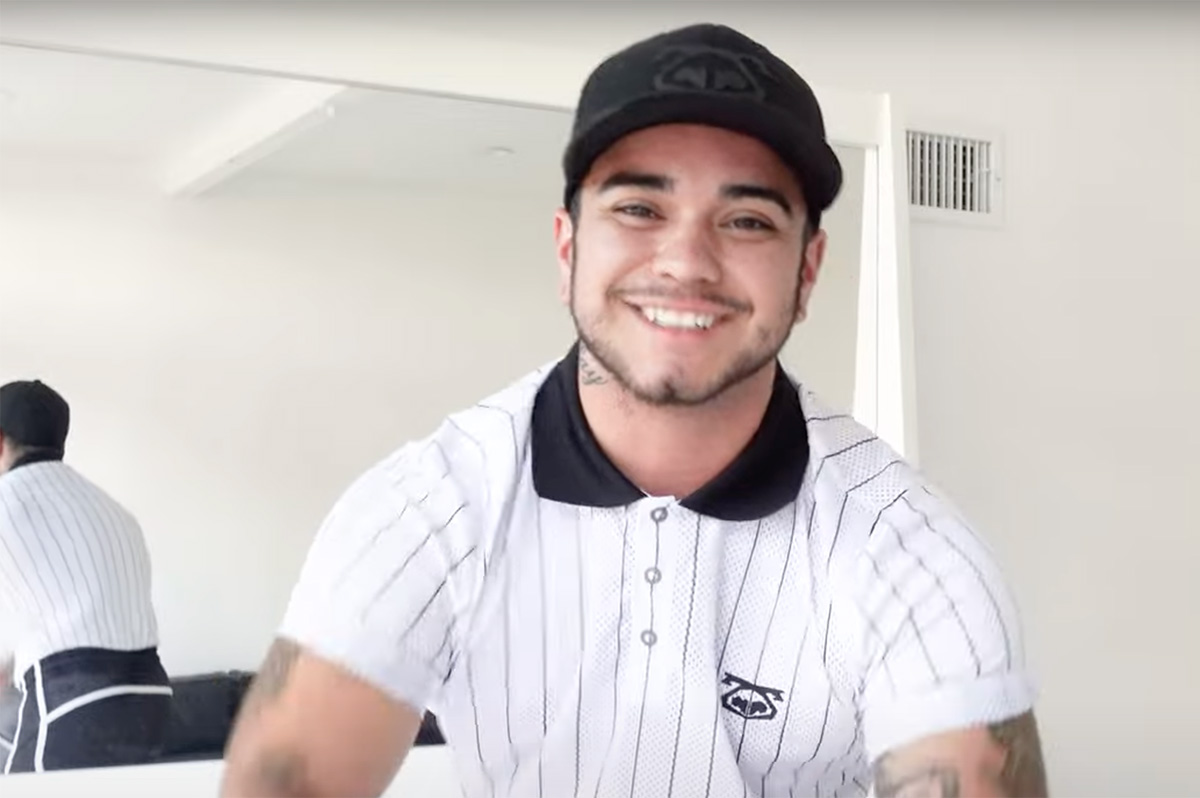
Apollo Moon, known as Forest Harader to his family, passed away on Monday in Los Angeles after being hospitalized in the ICU and on life support as of late November. His death comes as a shock to many of his fans who avidly supported his creative work as a porn creator and model. He was notably famous for being a BIPOC porn creator in a historically white dominated space.
The latest update from his family, according to a news site, is that his health declined after a recent injury, resulting in him being declared brain dead. They are asking the queer, trans and BIPOC communities to support them in ensuring he is properly grieved. His family posted on Meal Train asking for donations and so far, the community has shown their support, raising $12,750 of the $15,000 goal.
The post also says that his parents will be taking an extended leave from work, along with this sister, during this difficult time.
He was beloved and considered a leader in the transmasc community.
This is a developing story and we will continue to update details as they become available.
Events
LA events to attend in honor of Trans Day of Remembrance
If you’re looking to pay your respects or be in community with others, here are a few events to attend
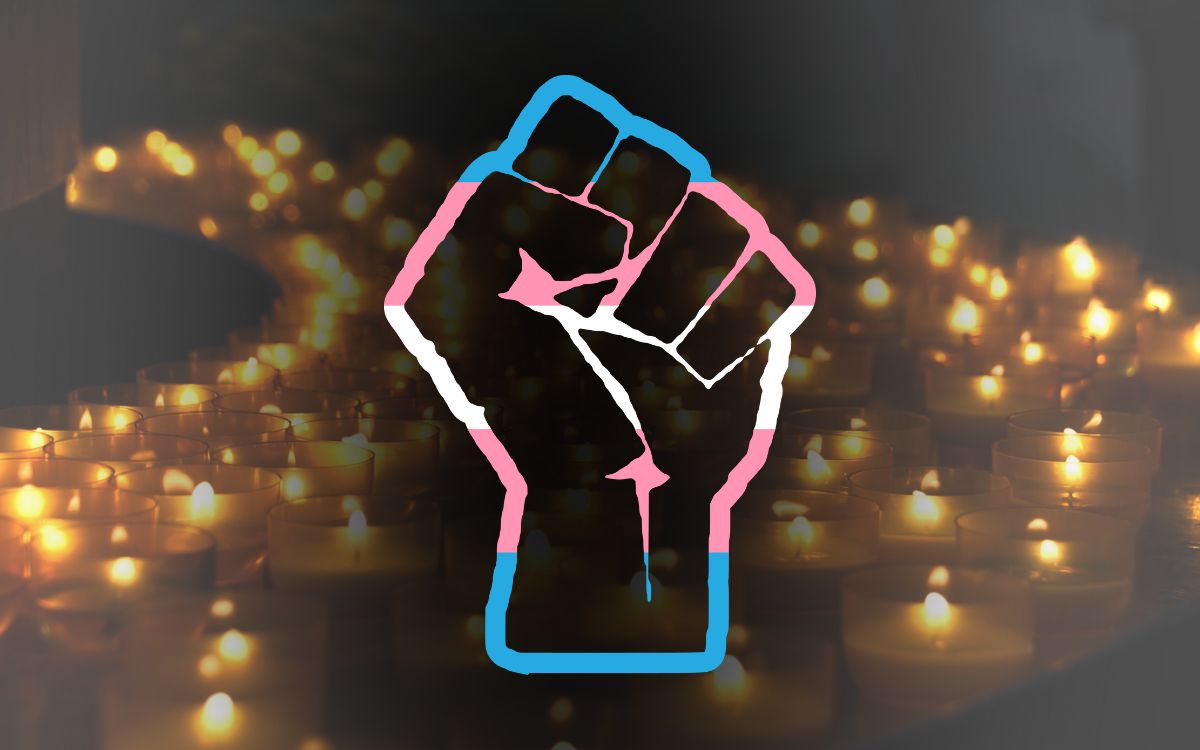
Content Warning: Mentions of hate, gender-based violence.
Trans Day of Remembrance is coming up this Nov. 20, preceded by the Trans Week of Awareness from Nov. 13 to 19.
This year has been full of grief for the transgender community across the country. In 2024 alone, the Human Rights Campaign has kept track of 27 transgender and gender-expansive people across the United States who died of violent causes, such as gun or intimate partner violence. According to the Los Angeles District Attorney’s Office Hate Crime Report on data from 2022, 44 anti-trans hate crimes were the highest number ever recorded in the county, surpassing 42 in 2019. The county crimes had a large rate of violence as well at 91 percent. TDOR seeks to honor the lives of people lost to this type of circumstance.
For those unfamiliar with the history, Trans Day of Remembrance started in 1998 with Gwendolyn Ann Smith. According to Vogue Magazine, the trans writer and activist heard of Black trans woman Rita Hester’s murder in Boston in an online forum, and found the case was greatly similar to that of another Black trans woman who had been killed in Boston in 1995, Chanel Pickett. Realizing a need for documentation, Smith created the Remembering Our Dead web project to track instances of violence against the trans community.
In 1999, trans community members in both San Francisco and Boston used the web project as source material to coordinate candlelight vigils, creating the November holiday.
“I am no stranger to the need to fight for our rights, and the right to simply exist is first and foremost,” Smith said. “With so many seeking to erase transgender people — sometimes in the most brutal ways possible — it is vitally important that those we lose are remembered, and that we continue to fight for justice.”
If you’re looking to pay your respects or be in community with others, here are a few events to attend. Allies welcome.
November 15, 6 p.m.: The Trans Advisory Board in West Hollywood is hosting a small reception and ceremony at the WeHo City Council Chambers. For more details, visit weho.org/lgbtq
November 20, 3 to 6 p.m.: Cal State L.A., is hosting a resource fair with music, vendors, and more to celebrate and commemorate the trans community. Find more information on their event page.
November 20, 4 p.m.: L.A. Civil Rights Department, Trans Advisory Council and the office of Councilwoman Traci Park are hosting a gathering at City Hall. Guests are invited to join an evening of reflection and community. Register for free through this form.
November 20, 5 to 7 p.m.: The queer and trans connect team at Latino Equality Alliance is hosting a special event inviting community members to bring photos for their TDOR altar and enjoy light refreshments. Find more details and register for the event for free through their online form.
Living
Gender-affirming care: Battling unsafe body enhancements
For many transgender individuals, altering their appearance can be an essential part of alleviating dysphoria, allowing them to feel more at home in their own bodies and to engage with the world in a way that authentically reflects who they are.
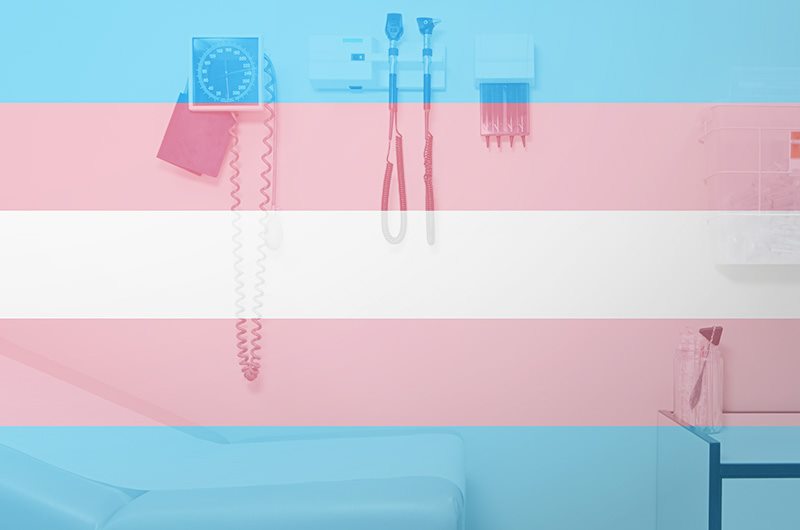
The use of silicone injections and other unconventional fillers like cooking oils, have gained traction within the transgender community as a method for body enhancement. These substances — often used in non-medical settings — are offered as cheaper, quicker alternatives to professional, medically supervised, gender-affirming procedures. While these treatments may seem like a lifeline for some people, their consequences are far more complex.
Imagine living a life wearing a suit that doesn’t quite belong to you, explained Dr. Natalia Zhikhareva, better known as Dr. Z, a gender psychologist based in Los Angeles.
Every day, they step outside, and people see a body—responding, interacting and defining based solely on what they perceive. Inside that body, there’s someone else. Someone with a different gender identity, and each time people misgender them based on that outer shell, it makes them feel like they’re being punched. It’s not just uncomfortable, but also painful, and a constant reminder that who they see, doesn’t match who they are.
This psychological distress is known as gender dysphoria. For many transgender individuals, altering their appearance can be an essential part of alleviating dysphoria, allowing them to feel more at home in their own bodies and engage with the world in a way that authentically reflects who they are.
According to a 2023 study by the Williams Institute at UCLA School of Law, “81% of transgender adults in the U.S. have thought about suicide.” This statistic highlights the need to address the systemic inequalities and societal pressures that transgender individuals face. From discrimination in healthcare, to pervasive stigma in everyday life, transgender people are navigating a world often hostile to their identity.
The emotional and physical impact of body enhancements
“I started to transition when I was about 19. At that time, they were using cooking oil [for body enhancements]. And I had that procedure done on my body. I got the oil injections because I looked at my trans friends, who were so beautiful and slender. It was easy for me to agree to do it,” Maria Roman-Taylorson, vice president & chief operating officer of the TransLatin@ Coalition, said in Spanish.
The procedure involved injecting oil into different body areas, creating pockets under the skin. Her body later rejected the procedure and she found herself in the emergency room.
“It seems either the liquid was infected or the technique was flawed, and I got infected all over my lower back and hip,” she explained. “The doctor had to cut each pocket to drain it, which was incredibly painful.”
Why trans people turn to these methods
Dr. Z explains that many people endure prolonged mental anguish to the point where they are willing to sacrifice their physical health to recover their peace and sense of self. She reflects on how access to gender-affirming care is both limited and costly, and in the current socio-political climate, it is becoming even more restricted. Dr. Z noted that in her practice, she has witnessed individuals taking extreme measures to alleviate their distress, such as self-administering silicone injections or traveling to other countries without knowing if the practitioners are qualified, all in a desperate effort to find relief.
“When society doesn’t provide treatment options, people have no choice,” she stated.
“The trans community is part of society. I pay taxes. I contribute and as such, I should have a place where they can provide me with services that respect my life and focus on helping and offering me with the best quality of services,” affirmed Roman-Taylorson.
Dr. Z believes that some people struggle to understand the complexities of gender, mainly because many of them don’t think about it in their daily lives. However, just because some may not fully grasp the concept, it doesn’t mean it doesn’t exist, nor does it negate the profound pain and unhappiness it can cause for some individuals. People often seek concrete facts—like a specific gene or medical evidence—to explain gender identity, but she feels this is the wrong approach.
Instead, she emphasizes the importance of recognizing when a fellow human being is in deep distress and pain, even to the point of contemplating suicide. Dr. Z believes that when witnessing such suffering, the compassionate response is to offer help in whatever way possible. For her, gender-affirming care is one of the most effective means of providing that support.
In a 2016 study, the National Library of Medicine indicated that liquid silicone injections could cause serious complications, including “…chronic cellulitis and abscess formation, ulceration, pneumonitis, cosmetic irregularities and asymmetries, perforation or injuries to critical structures, foreign body reactions and migration of silicone. These can present even years after injection.”
Silicone, in particular, can migrate over time, distorting the intended body shape and potentially leading to embolisms — blockages in blood vessels — if the substance reaches the bloodstream.
Roman-Taylorson describes that at 55 years old, she was hospitalized due to her body’s rejection of the silicone. She shared that in her case, one of the side effects of the liquid silicone injections, is cellulitis which led to a severe infection. The side effects cause her skin to turn black or red, swell, and become hot as if she has a fever. At times, the pain is so intense that it prevents her from walking, requiring hospitalization. Reflecting on her experience, Roman-Taylorson, acknowledged that she has paid a high price for the body she has today.
She said that desperation for acceptance can lead people to disregard fear, even in the face of considerable risk. Rather than dwelling on the dangers, she emphasizes that her decision to accept liquid silicone injections was driven by the possibility of finally being accepted by the world. She longed to be recognized as the woman she truly felt she was. For her, the surgery she underwent was the sole accessible option to achieve that sense of recognition and validation.
“When visiting the emergency room, doctors often lack the knowledge to address complications from these injections properly,” said Roman-Taylorson. In addition to medical challenges, trans people face judgment from healthcare providers who subtly question their decision to undergo these procedures. This leads to a sense of guilt and discrimination in the way they are treated. She emphasized that dealing with these biases only adds to the difficulty of managing their serious health issues.
The unpredictable journey
Yahni Ross, intake specialist and research assistant the TransLatin@ Coalition, expressed that despite having undergone the procedure herself, she would not recommend it to others because of the risks involved. At 32, she lives with loose silicone in her body and acknowledges that anything could happen. She explained that in the event of an accident, the silicone could shift, causing severe complications. She shared the story of a friend who was attacked and left with a deformed body after being stomped on. Ross noted that if the silicone in her body were to move, especially to sensitive areas like her eye, it could cause blindness. She stressed that the risks posed by silicone are significant and unpredictable.
An analysis by the National Library of Medicine reveals that many trans women turn to fillers, not just for enhancing their appearance, but also for safety. By using fillers to achieve a more feminine look, they aim to blend in and avoid being recognized as transgender in situations that could potentially put them at risk for transphobic violence or harassment, like being unwelcome in bathrooms or locker rooms, or being misgendered.
The threats of using liquid silicone and other harmful substances as body fillers highlight the urgent need for nationwide, accessible, and considerate gender-affirming care. Providing safe, affordable, and supportive medical procedures can save lives—not just by preventing dangerous physical complications, but also by ensuring trans people feel understood, and respected.
“People are born experiencing gender dysphoria, and as a result, [they] sometimes suffer decades and decades,” said Dr. Z. She advises that people don’t have to change their views to show compassion and kindness towards trans people.
Local
Forfeitures against San Jose State over trans athlete on roster spark controversy, backlash
Boise State, University of Wyoming and Utah State joined Southern Utah in forfeiting against San Jose State this season.

Blaire Fleming is at the center of a national debate over transgender athletes joining gendered sports at the collegiate level, after her team won fourth match by account of forfeiture.
Fleming made headlines earlier this year as her former roommate and team co-captain, Brooke Slusser, filed a class-action lawsuit against her and the National Collegiate Athletics Association. Slusser took to the Independent Council on Women’s Sports to file the class action lawsuit along with other cisgender athletes.
They claim that allowing Fleming and other transfemme athletes compete in women’s sports is in violation of Title IX, which does not permit trans athletes to compete against biological women, or use women’s restrooms.
The move to forfeit on account of a trans athlete, sparked controversy and driving the three other universities to forfeit in the recent weeks.
San Jose State responded to the latest forfeiture by stating that outing Fleming would have violated school policy.
The NCAA stated that it will “continue to promote Title IX, make unprecedented investments in women’s sports and ensure fair competition for all student-athletes in all NCAA championships.”
The controversy gained more traction as cisgender, far-right, voices joined the conversation.
Riley Gaines, a former competitive swimmer who came in fifth place in a 200-yard NCAA freestyle championship – tying with trans athlete Lia Thomas – took to X to speak on the issue and openly express her transphobia.
In the post, Gaines repeatedly misgenders Fleming, also adding that it is ‘unfair and dangerous,’ to allow transfemme athletes to compete in women’s sports.
Gaines is one of many far-right athletes who have either tied or lost a match to a trans athlete, then made it their mission to cast trans athletes out of women’s sports.
Equality California’s Executive Director released a statement regarding the issue.
“Equality California stands with San Jose State University and appreciates their strong support for their student athletes. All students deserve a safe and inclusive environment where they can thrive without fear or anxiety while being themselves,” said executive director Tony Hoang.
The San Jose State women’s volleyball team is scheduled to go against San Diego State on Oct 10.
Los Angeles Blade will continue to cover the issue as the story develops.
Transgender
Transgender Awareness Week 2021 begins as community is under siege
This annual tradition leading up to the Transgender Day of Remembrance brings awareness to the continued struggle the Trans community faces
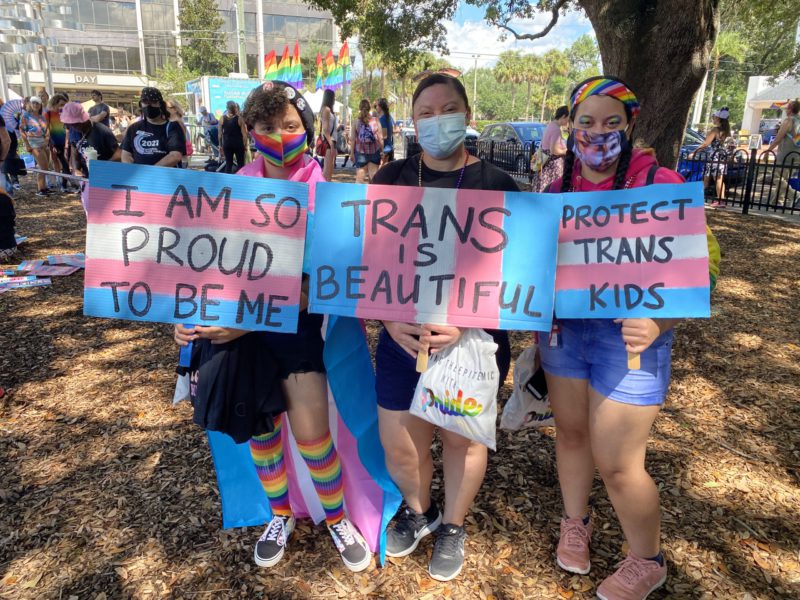
SAN DIEGO – The San Diego LGBT Center kicked off Transgender Awareness Week 2021 on Saturday November 13, by raising the Transgender Pride Flag over Hillcrest, San Diego’s ‘gayborhood.’ Several community members, activists and representatives from the city and county’s elected officials were in attendance.
This has become an annual tradition leading up to the Transgender Day of Remembrance on Nov. 20, which brings awareness to the continued struggle the transgender community faces and gives trans folks an opportunity to speak with their unique voices.
Last month hundreds of Out transgender people and allies from across Florida and from as far away as Southern California gathered in Orlando Saturday to rally and to march, demanding justice, equality and acceptance.
Chanting, “Trans Solidarity,” and “Hey Hey, Ho, Ho, Transphobia Has Got To Go!” participants in the 3rd annual National Trans Visibility March stepped off for their first march to be held outside Washington, D.C. This was also the first in-person parade since last year’s march was held mostly virtually, on account of the COVID-19 pandemic.
“There are so many of us who feel excluded from our cities and our communities,” said Ariel Savage of Riverside, Calif.
Ebony Harper, the Executive Director of California TRANscends, a statewide initiative that promotes the health and wellness of transgender people throughout California with a focus on Black and Brown transgender communities spoke to the Blade Saturday afternoon addressing the needs of the Trans community;
“While our community has some visibility in media, we still live under threats of violence and having our rights stripped from us. That’s our reality. This isn’t a narrative; these are facts!
This year alone, over 102 anti-trans bills have been introduced in 7 states. 47 to prevent trans kids from playing sports and the majority attacking how trans folks receive healthcare.
“At least 45 transgender people were murdered this year, the majority Black and Latinx transgender women. I’m one of many Black trans women advocating for our community, but you as an ally can have a powerful impact; Spreading awareness, resisting “the status quo” for us, speaking-up, is harm prevention. That’s humanizing our experience. We are divinely human, just as you are divinely human. That’s what this week is about. It’s about our humanity.
I’ll be speaking at several Trans Day of Remembrance events here in Northern California and I will talk about how you, the ally, have contributed to what we have now, but we’re just getting started. Find you a Transgender Week of Awareness event this week and show our community that we are in this together,” Harper told the Blade.
Photos by Christopher Gris, Field Rep. & LGBTQ Liaison for Assemblymember Christopher Ward, California’s 78th Assembly District
With the news of the killing of Marquiisha Lawrence in Greenville, S.C. on November 4 the Human Rights Campaign has now officially recorded more violent deaths of transgender and gender non-conforming people than any year prior.
At least 45 transgender or gender non-conforming people have been killed this year; HRC Foundation uses “at least” because too often these stories go unreported or misreported. Previously, the highest number of fatal deaths of transgender or gender non-conforming people that HRC Foundation has tracked over a 12 month period was just last year in 2020, when at least 44 transgender or gender non-conforming people were killed.
“We are at a tragic and deeply upsetting moment: With the death of Marquiisha Lawrence, 2021 has become the deadliest year ever for transgender and gender non-conforming people. Each of these 45 names represents a whole person and a rich life torn from us by senseless violence, driven by bigotry and transphobia and stoked by people who hate and fear transgender people and the richness of their experience,” Joni Madison, interim president of the Human Rights Campaign, said.
“Dehumanizing rhetoric has real-life consequences for the transgender community, particularly transgender women of color but especially Black transgender women. As we have seen an unprecedented number of bills introduced in state legislatures attacking transgender youth and trans adults, the moment we are in is clear. They have attacked transgender people’s right to health care, right to exist in public, and right to live openly, with the ultimate goal of dehumanizing and erasing their lives and experiences,” she added.
In Tampa, Florida, another Trans woman of colour was found murdered further raising the number of Trans women who were killed this year.
We are heartbroken to share news of the murder of Jenny, a 25-year old transgender woman, who was killed in Tampa Bay on November 2nd. Jenny is the 46th known trans or nonbinary person killed this year, making 2021 the deadliest year on record for trans Americans. #SayHerName pic.twitter.com/A3jbWgQDhY
— Equality Florida (@equalityfl) November 11, 2021
“Prominent Republicans are holding up the authoritarian Hungarian state as the model for the US to follow, in great part because Hungary has ended all government recognition of trans people, and criminalized LGBT media content. We are running out of time to prevent the effective end of the trans community in America.”
Brynn Tannehill, Trans author, Los angeles blade columnist and activist.
“In the face of seemingly insurmountable barriers, including a record number of anti-transgender bills and fatal violence, the trans community remains resilient and vibrant. The strength displayed by transgender and nonbinary youth in response to these attacks has been remarkable and should serve as a call to action for us all,” said Carrie Davis Chief Community Officer for The Trevor Project. “Every person has a role to play in creating a safer world for young trans people. The Trevor Project recently released a study that found transgender and nonbinary young people who feel accepted by the people in their lives are less likely to attempt suicide. This week, and every week, let us make clear that transgender and nonbinary youth deserve love, respect, and to live their lives without fear of discrimination and violence.”
Relevant Research
- Transgender and nonbinary youth who reported gender identity acceptance from at least one adult had 33% lower odds of reporting a past-year suicide attempt.
- Transgender and nonbinary youth who reported gender identity acceptance from at least one peer had 34% lower odds of reporting a past-year suicide attempt.
According to The Trevor Project’s 2021 National Survey on LGBTQ Youth Mental Health:
- More than half (52%) of transgender and nonbinary youth seriously considered attempting suicide in the past year— and 1 in 5 attempted suicide.
- 78% of trans youth stated that their mental health was “poor” most of the time or always during COVID-19.
- However, the data also illuminate protective factors:
- Transgender and nonbinary youth attempt suicide less when respect is given to their pronouns, when they are allowed to officially change their legal documents, and when they have access to spaces that affirm their gender identity.
- Transgender and nonbinary youth who reported having pronouns respected by all of the people they lived with attempted suicide at half the rate of those who did not have their pronouns respected by anyone with whom they lived.
- Transgender and nonbinary youth attempt suicide less when respect is given to their pronouns, when they are allowed to officially change their legal documents, and when they have access to spaces that affirm their gender identity.
Further, a peer-reviewed study found that transgender and nonbinary youth who report experiencing discrimination based on their gender identity had more than double the odds of attempting suicide in the past year compared to those who did not experience gender identity-based discrimination.
Research Brief: Diversity of Nonbinary Youth
- One in four LGBTQ youth (26%) in our sample of nearly 35,000 identified as nonbinary. An additional 20% reported that they are not sure or are questioning if they are nonbinary.
- While nonbinary identities have often been grouped under the umbrella term of “transgender,” our data show that only 50% of youth who identified as nonbinary also identified as transgender.
- The majority of nonbinary youth reported exclusively using pronouns outside of the gender binary, such as “they/them” (33%) or neopronouns (5%), such as “xe/xem.”
- When asked about ways other people can make them feel happy or euphoric about their gender, nonbinary youth overwhelmingly responded: having people in their life use the correct name and pronouns to refer to them. Nonbinary youth who reported that “no one” respected their pronouns had more than 2.5x the rate of attempting suicide compared to those who reported that “all or most of the people” they know respected their pronouns.
Research Report: All Black Lives Matter: Mental Health of Black LGBTQ Youth
- One in three Black LGBTQ youth identified as transgender or nonbinary
- 44% of Black LGBTQ youth seriously considered suicide in the past 12 months, including 59% of Black transgender and nonbinary youth
- 25% of Black transgender and nonbinary youth reported that they had been physically threatened or harmed in their lifetime due to their gender identity
- Black transgender and nonbinary youth reported twice the rate of police victimization (6%) compared to cisgender Black LGBQ youth (3%). Black LGBTQ youth who were involved with police victimization due to their LGBTQ identity reported rates of suicide attempts (32%) that were nearly double that of youth who were not (17%).
Transgender
West Virginia Sheriff posts transphobic meme gets transphobic comments
Mellinger posted the horrific meme on June 29, 2021. It wasn’t made private until July, 11, so in the meantime, it did a lot of damage.


By Kelli Busey | RIPLEY, W Va. – Jackson County West Virginia Sheriff Ross Mellinger posted a transphobic meme mocking the first transgender Miss USA contestant and as expected received hundreds of transphobic comments and likes.
Shortly after Kataluna Enriquez won the Miss Nevada USA Pageant, Jackson County Sheriff Ross Mellinger posted his thoughts on his personal Facebook page. Enriquez is the first transgender woman advancing to the Miss USA Pageant.
Mellinger made fun of her body and called being transgender “a craze.”
Jackson News Papers originally broke the story reported that Sheriff Ross Mellinger declined to comment.
Most of those who defend Mellinger said that it is his right to post memes on his public Facebook page. Those same people then proceed to disparage transgender people, a minority protected under the Civil Rights Act of 1964.
The more things change, the more they stay the same.
Ross Mellinger posted this horrific meme on June 29, 2021. It wasn’t made private until July, 11, so in the meantime, it did a lot of damage.
“So, I see the transgender craze has now invaded the Miss USA Competition…..”
His Facebook page now displays this notation on the post: “This Facebook post is no longer available. It may have been removed, or the privacy settings of the post may have changed.”
One Facebook user posted that in his defense, the Sheriff’s post wasn’t just about “hate”.
A leading Trans activist noted; “She was right, this isn’t just about hate. This is about firing a law enforcement official for refusing to acknowledge he was wrong for publicly inciting hatred against a minority.
Fun Facts:
Mellinger was elected to serve and protect all of the citizens, not just the ones he chooses to.
This is about an elected law enforcement official with a public Facebook page inviting people to mock a minority that their state just legislated against.
This about a white man who is afraid of a transgender Filipina-American woman of color.
This is about holding a law enforcement official to a higher standard.
This about holding him accountable if he refuses to do his duty.”
Planet Transgender took a screengrab of Sheriff Mellinger’s Facebook meme just in case he removed it or made it private without first issuing a public apology:
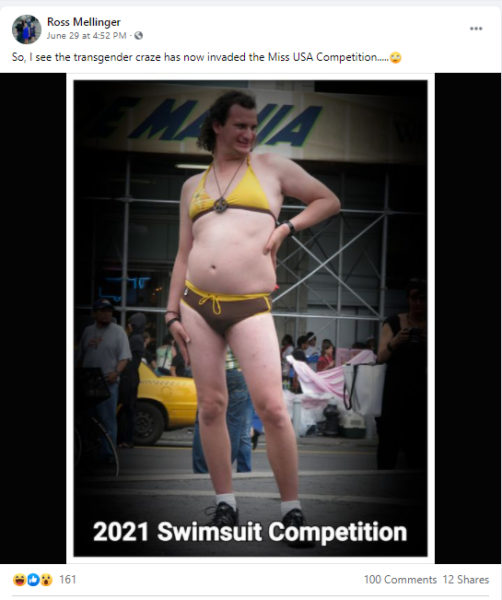
Kelli Busey is the Managing Editor of Planet Transgender magazine.
The preceding article was originally published by Planet Transgender and is republished by permission.
Transgender
Trans woman Lehlogonolo Machaba makes it to top 30 Miss SA
The first transgender woman to officially enter the South African Beauty Pageant, has made the first cut
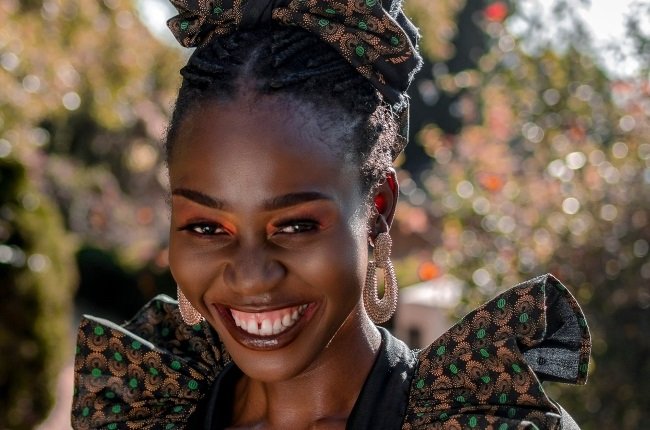

By Kelli Busey | MAHIKENG, NW, South Africa – Lehlogonolo Machaba, The first transgender woman to officially enter the South African Beauty Pageant, has made the first cut joining 29 gorgeous women as a top 30 semi-finalist.
Lehlogonolo Machaba, the only contestant from the North West, wrote in an Instagram post “I am proud to announce that I have OFFICIALLY made it to the #Top30 of #MissSA2021 thanks to all of you. This journey has been nothing but a great one and all of you have made this worthwhile. I will continue to push for change and acceptance of everyone in the LGBTQI+ community and being the first EVER TransWoman in the competition I can declare that by the grace of God TOP 15 here we come. Look out for all the information regarding voting on my next posts and Instagram stories. @official_misssa ”
Editor’s note: If you are from South Africa you can vote, for a fee, as a fifth judge by clicking here.

Kelli Busey is the managing editor at Planet Transgender
The preceding article was originally published by Planet Transgender and is republished by permission.
Transgender
Alleged Trans incident at upscale LA Spa may have been staged
The video quickly made the rounds in far right, and Trans-Exclusionary Feminist (TERF) sites and Anti-trans “feminist” websites.
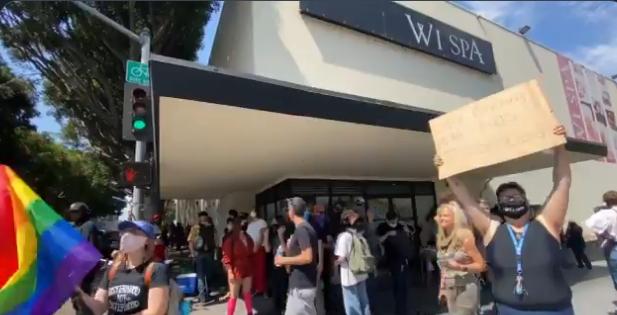
By Robert Lansing | LOS ANGELES – On June 24th, Instagram user “cubaangel” posted a video of herself angrily confronting a staff member at the Wi Spa in Koreatown, accusing them of letting a disrobed transgender person into the women’s section of the business.
There is increasing doubt among law enforcement and staff at the Wi Spa whether there was ever was a transgender person there to begin with. Anonymous sources within the LAPD tell the Blade they have been unable to find any corroborating evidence that there was a transgender person present on that day.
Similarly, a source at the Spa told the Blade there’s no record of any of its usual transgender clients on its appointments guest list on the day in question. Treatment at the Spa is by appointment only, and most of its transgender clients are well known to the staff.

Several other factors cast doubt on the veracity of the claims in the video. Cubaangel’s Instagram account is almost exclusively Christian memes, which begs the question why she chose to go to a spa well known for being LGBTQ friendly. During Cubaangel’s video, no transgender person can be seen, and no other witnesses have come forward to confirm the allegations made. It’s also not the first time Wi Spa has been targeted for catering to transgender people. After the alleged, unconfirmed incident, Wi Spa was deluged with 1-star Yelp! and Trip Advisor reviews.
It also remains a possibility that there was a person, unknown to the Wi Spa staff, who pretended to be transgender to create an inciting incident. In 2015, anti-transgender activists in Washington State deliberately encouraged men to enter women’s facilities. One cisgender man entered a swimming pool changing area wearing only board shorts while claiming that he had a right to be there (he was removed from the premises without charges being filed).
The video quickly made the rounds in far right, and Trans-Exclusionary Feminist (TERF) sites. Anti-trans “feminist” websites like Mumsnet, Ovarit, and Spinster were sharing content by far right provocateurs known for disinformation, like Ian Miles Cheong, by June 27th.
Shortly thereafter, flyers for a protest on July 3rd began circulating in religious right, far right, and TERF social media circles, and were shared by Cubaangel on the 29th and users on Spinster. They discussed defending the alt-right troll website, Kiwifarms, which is known for targeting transgender women.
Prior to the protest, a Los Angeles trans woman was falsely accused by anti-trans feminists of being the alleged transgender person in the video. She received multiple death threats and harassment, including a picture of a masked man brandishing an assault weapon threatening to shoot her.
The anti-trans protest was a mix of religious fundamentalist street preachers, QAnon conspiracy theorists chanting “save our children,” and Proud Boys. Black-bloc (like Antifa) and trans activists engaged in a counter protest at the same time, and violence erupted. Right wing personality Andy Ngo, who coordinates with far right groups when they’re looking to engage in violence on camera, was also there.
A right-wing protestor drew a gun on a person recording the event and told him it was “something to shoot you with.” A videographer wearing a vest marked “PRESS” was struck from behind by a right wing protester with a metal pipe. Another anti-trans protester stabbed two people: a pro-trans counter protester who was reportedly hospitalized by the wound, and a fellow anti-trans protesters while she was attempting to help him off the ground. The LAPD quickly declared the protest and counter-protest unlawful assemblies and dispersed them.
All of this fits into an emerging pattern of the alt-right, anti-Semitic conspiracy theorists, violent far right groups like the Proud Boys, the religious right, and anti-trans “feminists” collaborating and coordinating as they share the same media streams. Rhetoric against transgender people in popular right-wing media like Fox News has grown both more frequent, and more extreme. In April, Tucker Carlson (who serves as a gateway to the far right) declared that transgender people are a threat to the “perpetuation of the species.”
Dr Joe Mulhall, head of research at the UK’s renowned anti-extremist watchdog group Hope Not Hate, discussed this trend in a recent interview. “We see more anti-trans content from within the far right than against any other minority today… [They] disproportionally talk about trans rights way more than Muslims now”. He sees transphobia as more accepted publicly than anti-Semitism. “Talking about Jews isn’t. It ostracizes you. But if you talk about trans issues it opens the doors to the mainstream. The far right are saying things they know will be echoed in the comment pages of the right-wing press.”
Flyers are circulating online advertising a second protest against Wi Spa on July 17th. LAPD sources says they are aware, and will be taking steps to avoid a repeat of July 3rd. However, as of publication, no warrants, indictment, or arrests have been made as a result of the violence.
Robert Lansing is a pseudonym for a long time investigative trans researcher and writer-journalist. Use of the pseudonym is to protect the writer from retribution and potential harm by right wing extremists.
-

 Breaking News4 days ago
Breaking News4 days agoProject Angel Food loses $340,000 grant to feed people living with HIV
-

 COMMENTARY3 days ago
COMMENTARY3 days agoWhat if doctors could deny you insulin for being gay?
-

 Commentary1 day ago
Commentary1 day agoThe Supreme Court’s ‘Don’t Read Gay’ ruling
-

 Opinions4 days ago
Opinions4 days agoThe psychology of a queer Trump supporter: Navigating identity, ideology, and internal conflict
-

 Breaking News4 days ago
Breaking News4 days agoTrump administration sues California over trans student-athletes
-

 Living4 days ago
Living4 days agoFaithfully queer: Finding God and growth in Modern Orthodoxy
-

 a&e features1 day ago
a&e features1 day agoThe art of controlled chaos: Patrick Bristow brings the Puppets to life
-

 Sports34 minutes ago
Sports34 minutes agoHololive and Dodgers create a home for queer fandom







